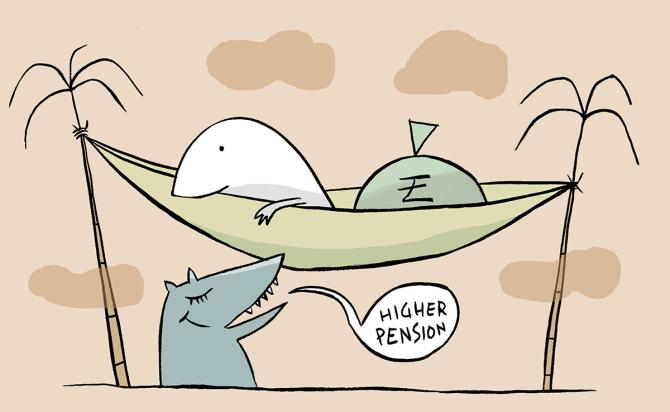Remember, pension from EPS will be taxable at slab rate, reducing the post-tax income for people who remain in the higher tax brackets after retirement.

The deadline to opt for higher pension under the Employee Pension Scheme (EPS) has been extended to June 26, 2023.
Subscribers should use the additional time to take a well-considered decision regarding whether to go for this option or stay with the current one that offers a higher lump sum from Employees' Provident Fund (EPF) with lower pension.
Pension will rise
The formula for calculating EPS pension is: Pensionable salary (average of basic salary plus dearness allowance over 60 months before retirement) into years of pensionable service, divided by 70.
Suppose that a person joined employment on April 1, 2000 and will retire on March 31, 2030.
His joining salary is Rs 15,000 per month and grows 8 per cent annually until retirement.
His pension under the old scheme would be Rs 4,864.
Under the higher pension scheme, it will rise to Rs 57,169.
Are you eligible?
Check whether you are eligible for this scheme.
"It expands the scope of higher pension to employees who were members of the EPF on September 1, 2014," says Pratyush Miglani, managing partner, MVAC Advocates & Consultants.
There are two additional conditions.
"You should have contributed more than the prevalent wage ceiling of Rs 5,000 or Rs 6,500 and you should not have exercised the joint option with your employer for such a higher contribution," says M Pattabiraman, associate professor, IIT-Madras and founder, Freefincal.com.
No free lunch
The higher pension will entail a trade-off.
"A portion of your EPF corpus, along with interest earned will get transferred to EPS," says Deepesh Raghaw, Sebi-registered investment advisor and founder, PersonalFinancePlan.
The lump sum from EPF upon retirement will reduce.
Is the new scheme attractive?
If you look purely at the math of the two options -- new versus existing -- the former looks very attractive.
"No safe investment avenue (using the lump sum from EPF) will be able to generate the kind of pension you can get from EPS. This is assuming you don't suffer a job loss and work until 58," says Raghaw.
Those with longer life spans will benefit more.
"A fixed amount will keep coming in irrespective of how long you live," says Vishal Dhawan, chief financial planner, Plan Ahead Wealth Advisors.
Multiple caveats
The decision to opt for a higher EPS pension may not prove beneficial in certain scenarios.
Early demise:
Under the existing scheme, you get a higher lump sum from EPF which you can invest in income-generating instruments to generate the required cash flow.
After your lifetime, the principal gets returned to your nominees.
In EPS, 100 per cent of the pension is paid during the subscriber's lifetime.
On his demise, the spouse gets 50 per cent of the pension and up to two children get 12.5 per cent each.
Once the spouse passes away, up to two children get 37.5 per cent each. The child pension stops at 25.
"If the subscriber passes away early, the benefit from this scheme reduces," says Raghaw.
Early retirement:
Raghaw points out that retiring early will reduce the years of pensionable service and hence the pension.
Going abroad to work will have the same effect.
If you take it easy:
You may decide to take a lower-paying but easier job in the final years before retirement.
When you opt for the higher pension scheme, your EPS contribution will depend on your actual basic salary.
But when your pension is calculated, the average basic salary over the final five years prior to retirement will be considered.
If it is lower, the pension will also be smaller.
Difficult to sustain burden:
The annuity rate of the higher EPS pension is in double digits.
"The EPFO is already struggling to credit interest on time. If too many people opt for this scheme, it could delay pension payments. No establishment can afford to pay double-digit annuity rates and stay afloat," says Pattabiraman.
Capital locked in:
Dhawan points out that the principal in your EPS corpus can't be accessed under any circumstance.
Finally, the pension from EPS will be a fixed amount and not inflation-adjusted.
Who should opt for it?
Employees who have not invested enough for their retirement nest egg may opt for it.
"They will be able to generate a pension of approximately half their last drawn pay," says Pattabiraman.
Dhawan has a different point of view.
"People who have enough assets, so that the permanent lock-in of principal doesn't matter to them, can go for it," he says.
Those who want a fixed return will also find the scheme appealing.
Who can do without it?
Those who have been investing in equities over the years, or have enough years of work life left to do so, need not go for it.
"They can let the money grow in EPF and upon retirement deploy it in different assets to generate inflation-indexed income," says Pattabiraman.
Those who have just retired or are about to retire should consider their Withdrawal Rate (WR): The amount withdrawn each year currently divided by the total corpus (excluding emergency funds).
"If the WR is below 4 per cent, this scheme is unnecessary. If it is above 4 per cent, such people don't have enough assets to beat inflation and should go for the higher EPS pension," says Pattabiraman.
Remember, pension from EPS will be taxable at slab rate, reducing the post-tax income for people who remain in the higher tax brackets after retirement.

Disclaimer: This article is meant for information purposes only. This article and information do not constitute a distribution, an endorsement, an investment advice, an offer to buy or sell or the solicitation of an offer to buy or sell any securities/schemes or any other financial products/investment products mentioned in this article to influence the opinion or behaviour of the investors/recipients.
Any use of the information/any investment and investment related decisions of the investors/recipients are at their sole discretion and risk. Any advice herein is made on a general basis and does not take into account the specific investment objectives of the specific person or group of persons. Opinions expressed herein are subject to change without notice.











